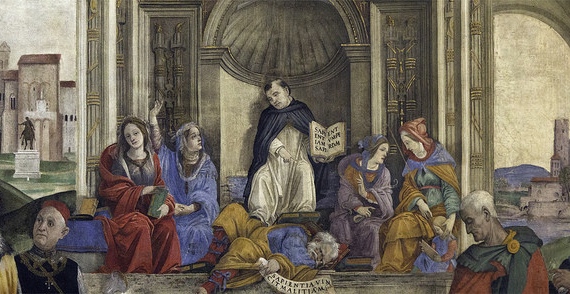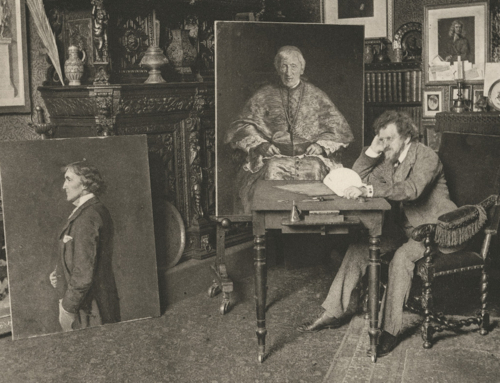I figured it would come up eventually, but it took until the end of the very last class. I had wrapped things up, giving a few tips about the final and a reminder about the optional review session. As the students packed up to leave, I reminded them that I would be skipping town the day after the final exam, returning here to Washington, DC, and to my studies for the priesthood, but that I would still be accessible by email. Although I mentioned these details at the first class, five long weeks of three-hour physics sessions must have clouded their memories. The fact that I was not yet an ordained priest, and not a full-time member of the faculty at Providence College, where this summer course took place, seemed like brand new information to these students. As a result, they seemed more fascinated, and more willing (though still sheepish), to ask the question I get fairly often in one form or another: “How does a physicist find his way to the Dominicans?”
The combination of physics and faith is surprising to most people, and a Dominican who studies and teaches physics can seem incongruous. In fact, you could argue that it might have seemed incongruous to St. Dominic himself. In the earliest extant copy of our Constitutions, which date back to the 1220s when St. Dominic first organized the Order with his brethren, there is an explicit prohibition that students
shall not study the books of pagans and philosophers, even for an hour. They shall not learn secular sciences or even the so-called liberal arts, unless the Master of the Order or the general chapter decides to provide otherwise in certain cases. But everyone, both the young and others, shall read only theological books.
This seems to place the Dominican physicist, as well as the Dominican economist, English professor, historian and even the Dominican philosopher, in a tough position. It almost appears that the very notion of an institution like Providence College, where Dominicans have taught almost every subject over its nearly century-long history, is an aberration in the designs of our founder.
In some ways, this prohibition on non-theological disciplines seems to fit with the character of St. Dominic, who, in a beloved phrase from the earliest brethren, “always spoke either to God or about God.” Blessed Jordan of Saxony even mentions favorably in his biography of the founder that early on Dominic was anxious to move beyond the liberal arts and into theology, “as if he were reluctant to waste his limited time in these less fruitful studies.” There always is, and should be, a primacy for the Divine in any Dominican, and no Dominican priest escapes formation without rigorous theological training. But it is hard to claim that we all live up to the lofty example set by our founder.
Thankfully, and perhaps mercifully, the ideal of Dominican life is rarely imagined as the close imitation of all aspects of St. Dominic’s life. Rather, the ideal is to follow the way of life he established in the organization and governance of the Order, including the wisdom to allow for dispensation and development over time. While much has remained the same over 800 years of Dominican life, a wide range of things have changed, and the prohibition on secular studies was one of the earliest to be debated and amended. Within a few years of those earliest Constitutions, the Order expanded exponentially, in large part by attracting students and masters of the very secular studies that were initially prohibited and by inspiring these men to devote their lives to theology and preaching. While they generally set aside their earlier pursuits, many saw the value that the secular knowledge they had gained could bring to their preaching and teaching.
The early prohibition reflected not only the temperament of St. Dominic but also the concerns of the Church, which was suffering because of inadequate theological formation among the clergy and a growing tension with those interested in the rediscovered works of ancient Greek authors like Aristotle, which were sometimes pitted against the authority of established doctrine. It would, in fact, take the next generation of Dominicans, especially St. Albert the Great and his student St. Thomas Aquinas, to show how these seemingly dangerous secular studies in logic, natural philosophy, ethics, and metaphysics could, when read in service of the Church and her teachings, bolster and strengthen the very theology that was the accepted “Queen of the Sciences.”
Although St. Dominic may not have explicitly envisioned Dominican physicists, economists, historians, or even Dominican philosophers, I would like to think it is a development he is happy to see. His very inspiration for founding the Order was to defend the goodness of the created order against the heresy of the Albigensians (who maintained that the physical world was evil). In a modern world that too often fails to see how God is connected to the many created things that fascinate us, be it nature, art, money, or any other pursuit, there is a value in having a few Dominicans who can make the appropriate connections and reveal the Divine plan behind it all. Sometimes, to truly speak about God, you have to begin with whatever topic your listeners–whether they are parishioners, students, or strangers–are open to, a truth St. Dominic would clearly embrace.
✠
Image: Fr. Lawrence Lew, O.P., St Thomas in Rome







